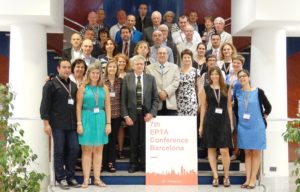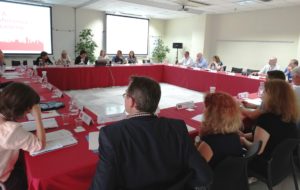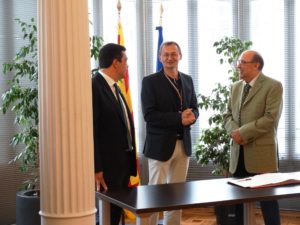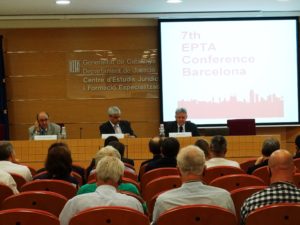 European Penitentiary
European Penitentiary Training Academies Network

The 7th Conference of the European Penitentiary Training Academies (EPTA), organised by the Centre for Legal Studies and Specialised Training (CEJFE) took place in Barcelona, Catalonia on 25, 26 and 27 June 2014. The conference was attended by delegates of Andorra, Armenia, Austria, Bavaria, Belgium, Croatia, Spain, France, Georgia, Ireland, Italy, Norway, Poland, Romania, Sweden, Switzerland and Catalonia, whilst the representatives of Northern Ireland and Denmark presented apologies for their absence. Taking part in the conference as guests, there were also representatives of EuroPris, the European Organisation of Prison and Correctional Services, and Penal Reform International (PRI), the organisation that watches over the observation of human rights in the sphere of penal justice.
The conference closed one year of the EPTA Catalan presidency. The CEJFE presidency was decided during the meeting held by EPTA in Ireland, in the summer of 2013. During its presidency, CEJFE has promoted the relationship between the different schools by drafting and disseminating their main data, and those of the respective prison administrations, through the creation of specific fact sheets; CEJFE has also opened formal contacts with EuroPris to appraise a possible framework for cooperation; it has created a website with information connected with the EPTA network, and the penitentiary academies of Bulgaria and Portugal were contacted in order to promote their preliminary participation as observers in this European network.

The plenary session of delegates and observers
Wednesday, 25 June
In the afternoon of the 25th issues directly related to the international functioning of EPTA were broached. One of the main points was the appraisal and voting of Bavaria’s application to take part in the network as a full member. Given its commitment to the goals of the organisation, as well as its willingness to work on developing them, all the delegates were in favour.
The plenary also tackled a possible relation between EPTA and EuroPris. The report was given to the participants beforehand, which proposed a framework based on the potential of both institutions, and the brief presentation of EuroPris by its representative served to launch a debate about the aspects in favour of and against whatever that collaboration might entail. Through the debate, with a large number of delegates, needs to be emerged to share and reach a consensus with their respective governing bodies on a specific position in relation to the framework of that future association. It was considered appropriate to look more deeply into the possible snags and advantages that might be involved in the incorporation of EPTA into EuroPris.
Lastly, and at the suggestion of the Irish delegation, it was agreed to set up a working party to scrutinise and collect the contributions and positions of the different administrations concerning this proposal in order to continue to delve more deeply into its viability and appropriateness. It was decided that the party would be made up of the administrations of Bavaria, Italy, Sweden and Catalonia (that will act as coordinator).
Next, came the presentation of candidatures for the presidency of EPTA for the period 2014-2015. Italy’s offer, which stressed its wish to bring continuity and guarantee the future of the network, despite the processes of change which the Italian penitentiary administration is going through at the moment, won the unanimous support of the delegations. Italy undertook to work towards the following goals:
The plenary session ended with the presentation, by the representative of Penal Reform International, of the main goals of the organisation and the online training project it has developed which aims, within the framework of the United Nations Bangkok Rules, to deal with interventions with women serving a prison term or subject to other penal measures.
Official reception of the delegates and welcome to Bavaria
The director of the Centre for Legal Studies and Specialised Training, with the director-general of the Catalan Prison Services, welcomed the participants to the conference and expressed his gratitude for the presence of delegates of almost all the training academies that make up EPTA. He also recalled Catalonia’s European
vocation throughout its history. He encouraged the Italian representatives in their new challenge as presidents of the network for the period 2014-2015.
Last came the signing of the protocol of membership of the EPTA network by the representative of Bavaria.

The official inauguration of the conference
Thursday, 26 June
On Thursday 26 June began with the official inauguration of the 7th Conference of the EPTA network by the president of the PCCP of the Council of Europe, Mauro Palma; the Catalan minister of Justice, Germà Gordó; and the director of the Centre for Legal Studies and Specialised Training, Josep Xavier Hernández. In his speech, Mr Palma emphasised that one of the cornerstones of the rehabilitation process, which is the ability to increase the prisoners’ quality of life, is possible thanks to the efforts expended in the policies for the selection and training of the professionals in the prison sphere. He stressed the effect of those processes on the professionals’ attitude since they encourage them to create and maintain positive relations with the prisoners in order to reduce the risk of problems in prisons, to increase security and, in short, to favour the processes of rehabilitation and make the job more gratifying. Then the director of CEJFE highlighted the value of training over the last 30 years since the setting up of the prison services in Catalonia. He also pointed to the need for it, not only as a response to the principle of efficiency and improvement of the public services, but as a matter of ethics and an imperative for ensuring that that improvement would have an effect on the prisoners and, in the end, society in general. Moreover, focusing on the activity of CEJFE, he emphasised aspects such as the attitude of cooperation and attention to the strategic needs of the prison authorities and the value of training and research for providing a response to them.

The minister of Justice pointed out the “clear European vocation of the Department of Justice through its presence in a number of international organisms and European projects. “That international presence of CEJFE is fundamental for updating and innovating in the field of criminal justice, through its main activities: training and research”. In that context, he mentioned the participation of CEJFE as a founder member of EPTA, its commitment to the goals and values of the network and the effort made under its presidency, which had focused on strengthening the relations between all the training centres. Lastly, he thanked the delegates at the conference for their participation and involvement and proceeded to the official inauguration.
Experiences in the management of prison security
The morning’s papers revolved around the experiences in the management of prison security of four of the territories that are part of the EPTA network. Belgium, through its representation of the OCPP School, expounded its model for the participation of the prisoners in the communal life of the jail. This model, implemented since 2005, starts from the creation of consultative bodies made up of professionals and prisoners relating to the communal life of the prisons in order to improve peaceful coexistence and reduce conflict and as an element of normalisation of life inside the establishments.
The representative of the other Belgian training centre (CFPP) presented its model of prevention, management and support for the professionals in the face of the prisoners’ aggressive behaviour. It was mentioned the existence of special intervention teams for situations of that kind. They intervene with both the prisoners who have behaved in that way and their victims. In its paper, Croatia presented its dynamic security model, highlighting some of the elements that contribute to its creation and maintenance. And so the paper revolved around the treatment teams, analysing their configuration and the positive effects they generate. It also analysed the effect of training and described the areas that it should be concentrated on, singling out the management of communication and
aggressive behaviour.
Lastly, it was presented the results of a working party that analyses the role and behaviour of the professionals who work in prisons and submitted a series of recommendations to contribute favourably to that model. For its part, Romania provided a series of reflections on its dynamic security model. On the one hand,
the presentation revolved around the training model that accompanies it. They said that since 2009, they had had an intensive training plan for the prison professionals, focusing on communication and negotiation skills. On the other, they referred to a system of credits they use with the prisoners, which fosters motivation for pro-social conduct. Lastly, they set out the goals of the national strategy for their social rehabilitation.
Catalonia presented the participation model and the intrapenitentiary mediation model as part of a new paradigm that guides relations between professionals and prisoners. Concerning the participation and peaceful coexistence model, they stressed that it is not implemented in all the prisons in the same way, but that there are different levels according to the characteristics and the moment of each one. They expounded the specific case of Lledoners prison, where the model is being developed through participation committees, a reception plan for the new prisoners and particular management of information. Another axis of the intervention is the alternative conflict management model through mediation. They described the goals and types of application of the programme and the good results that have been obtained.
Workshop “Basic training in the prevention of conflicts”
On Thursday afternoon a workshop with the EPTA participants was held. The aim was to create a training programme on the prevention of conflict in prisons which could be taken on by the different schools and would be sure of EPTA accreditation.
The participants divided into two workgroups according to language (French and English). The territories that made up the English group were: Armenia, Bavaria, Belgium, Croatia, Georgia, Ireland, Norway, Poland, Romania, Sweden and Catalonia, whilst the representative of Austria presented apologies for absence. The French group was made up of Andorra, Belgium, Spain, France, Italy, Switzerland and Catalonia.
The workshop discovered, especially in the English language group, the most numerous, the difficulty of pooling a possibly over-ambitious task (the construction of a training programme) when the training models, as well as the theoretical and organisational references of each academy, are quite different. However, it was interesting to work on specific practical aspects which, despite their operational difficulty, led to fruitful debates.
Click here to download the full report of this workshop.
Methodological experiences in training
Friday, 27 June
The last day of the conference was organised around the experiences presented by nine delegates on specific methodological models applied at their training centres.
The day began with the paper from Austria, which presented its initial training model (basic) for the security professionals, focusing on the “non-use of physical force” and a combination of theoretical and practical contents. One of the methodological tools used in these activities is role play from real everyday situations in which some of the students take part as actors and the others as observers. A viewing of the recorded images helped with analysis between teachers and students about professional behaviour and roles.
Next, France presented some of the changes its training model had undergone, singling out the reformulation of its educational structure, from a model of assessment and completion of contents to a model of assessment in skills. They also presented different training modalities that combine theoretical content and practical situations, such as the time spent by directors on the course at other prison administrations, fire practice, shooting practice or self-defence classes. Switzerland presented its training model for guards, stressing the new role of the trainer as a facilitator and/or guide in the resolution of practical situations. Through role-play, the students simulate the management of prison and work, among other things, on techniques of negotiation, strategies of ethics, management of quality and human resources or professional skills such as communication and leadership. These activities promote participation and initiative on the part of the students and the trainer occupies a secondary role. In its paper, Spain presented a catalogue of methodologies related to the introduction of the new technologies into the learning processes, especially the ones linked to ongoing training, and their efficacy as a resource to help with access to training, especially in large territories. The commitment to the new technologies is set in the context of an increase in computer resources at prisons and a decentralising training policy.
Poland presented the changes introduced into training, both initial and ongoing. The most significant changes have taken the shape of a considerable increase in the length of the courses, introducing achievement exams, the presence of a tutor, a stay of one month for practical experience and the specialisation of the professionals aimed at improving their career.
Norway spoke of the change introduced in 2012 into its training model which made it equivalent to regulated university teaching. This model is based both on theoretical training and a practical part with supervisors who undertake the monitoring of the students. There is also alternation between learning at the training academy and practice in prisons. The interrelation of students, teachers and supervisors fosters an educational model in which each of them gives value and smoothes the running of the educational space.
Georgia presented the main innovations introduced into the training modalities, notably the “mentoring” programme. This consists, in a context of practical training, of encouraging the relationship between the professionals with less experience and their mentors, who have been selected on the basis of their experience and good practices. This programme contributes to improving the adaptation of the professionals to the work environment as well as affecting and improving their performance.
Bavaria presented its training course aimed at the improvement of the professionals’ social skills through an analysis of their own behaviour and that of their colleagues. The methodology applied to accomplish the goals of the course involves the use of role-playing techniques, the creation of spaces for group discussion and tests and games that encourage the teams’ involvement. These methodologies guide and help with the assessment and improvement of the professionals’
behaviour.
To end, Catalonia presented the “Compartim” knowledge management programme. It promotes learning through an exchange of experiences and the sharing of good practices around a specific topic in which professional experience is configured as the main dynamising element and the main source for generating knowledge. The space for exchange is promoted through attendance sessions and a virtual platform, the result is a guide to intervention in the problems tackled by the group.
Rome takes over from Barcelona
At the closing of the 7th EPTA conference, the director of CEJFE handed over to Domenico Schiattone, director of training at the Istituto Superiore di Studi Penitenziari in Rome, the official documents of the EPTA network. He wished them a successful presidency and acknowledged their effort in taking up the challenge. For his part, Mr Schiattone expressed to the delegates their commitment and will to continue to boost and strengthen the main values of EPTA and invited them to the conference to be held in 2015 in Rome.


Supported by the Justice Programme of the European Union